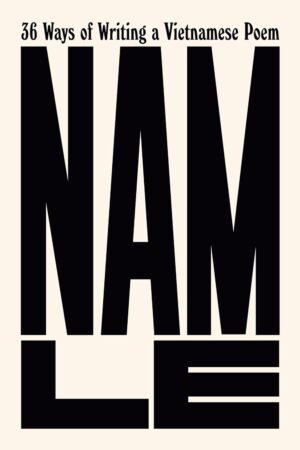36 Ways of Writing a Vietnamese Poem
Nam Le
Reviewed by Manan Kapoor
Nam Le’s 36 Ways of Writing a Vietnamese Poem, a collection in which each poem is a “way” that uses a different lens, opens with “[1. Diasporic]”:
In English, mind You.
You dink I writee Yiknamee?
Shame on You.
It was Your violence dumbed me.
The second-person pronoun—capitalized each time—takes center stage. Whether we associate ourselves with “You” or assume we’re witnesses to a conversation with an off-frame figure, Le draws us in. In the next poem, “[2. Invocation / Apostrophic],” he makes the dialogic nature of his collection clear though the absence of a capitalized “You” suggests a shift: “To you, mind you. Always.” We soon realize that 36 Ways of Writing a Vietnamese Poem interrogates the poet’s interiorities and exposes the exterior landscape that inform them.
In the first poem, which mimics a migrant’s English, Le dwells on the complexities of language, adding syllabic breaks to “displacement,”
Dis place ment
Everything to me
and he ends the poem with:
Shame on me.
What do I know?
What’s Vietnamese in me
Could fit in a poem.
What does it mean that one’s identity (or even a part of it) can fit in a poem? Is Le conveying the inertia of a diasporic poet about his beginnings? Or is he implying that a poem—even a short poem—can meaningfully convey the experience? We start to wonder: what sort of poem—what length? A haiku or an epic? And if so, does it matter? Is this poem an ode to a lost home or an elegy for the self? And as we ponder, we realize that 36 Ways of Writing a Vietnamese Poem can be read both as a collection of poems and a book-length poem leading to further questions. This unresolved line stays with us, turning and shifting as we move through each of the ways, forcing us to recognize the unfixity and in-betweenness that diasporic writers have to confront, endure, and at times, celebrate.
Throughout the collection, Le exposes the complexities of writing from this position, focusing not on binaries but allowing readers to dwell in uncertainties. In “[3. Ekphrastic],” after noting how various details in his grandmother’s photograph give an “effect of flatness,” what the “off-centered mandarin collar” reveals, he exposes everything that the photograph conceals, what it “cannot say,” closing with: “Now write about it what you like.” The poem “[24. Violence: Translative]” begins “F/or You are a Poet-Translator… / You are the Keeper of the great keep” and moves on to claim “Borders to You mere form / You are a Cosmopolis, the centrality” before it turns:
So You don’t know Vietnamese.
…..Did Pound know Chinese? Did Rexroth? Snyder?
Fenollose? (Do I either? Ha ha!)
The poems constantly shift between humor, anger, sorrow, and despair, as Le challenges our assumptions and expectations. Several poems focus on violence of different kinds—taxonomic, linguistic, cultural, geopolitical and ideological—and reveal their consequences in a new light. In the notes to “[32. Intra-diasporic],” he stresses that the “failure to differentiate [between the experience of various immigrants and refugees] is a violence.” In the poem, quoted here in its entirety, he writes:
My family came to this country with
Nothing more than a small knapsack…
full of cut diamonds
With each “way,” we find ourselves at the center of the poem, questioning our assumptions about diasporic writing. Le’s formal precision and these unpredictable turns challenge the way we perceive diasporic literature while simultaneously revealing its complexities—we read and think about these poems with Le. The final surprise is the inclusion of the thirty-seventh poem, “[37. Post-racial / -glacial],” the longest in the collection. Supassing the thirty-six ways and using ecopoetic overtones, it imagines a post-racial world where writers are unencumbered and the expectations of representation are washed away.
If I must be something
……….Let me be outwash plain
………………………………….lowland
past glacier’s margin, glacier’s edge
…………………..thaw and drift convene
breathtaking arguments of light
……………………………….over me
where what matter was argued
has long evaporated
Though this final poem offers a utopian impossibility, it gives the readers (and the poet) something—another way of writing a Vietnamese poem. In “[2. Invocation / Apostrophic],” Le writes, “Whatever I write is / Vietnamese.” At the end of the collection we return to this line, but after the unexpected thirty-seventh poem, it turns and we read it in a different light.
Published on August 15, 2024

